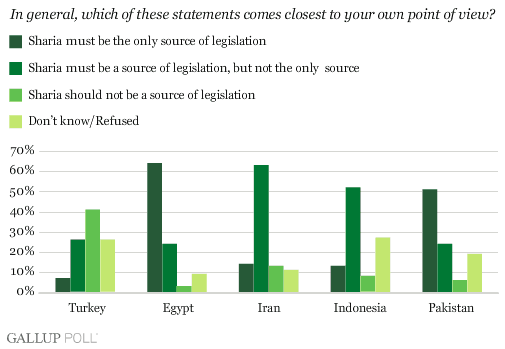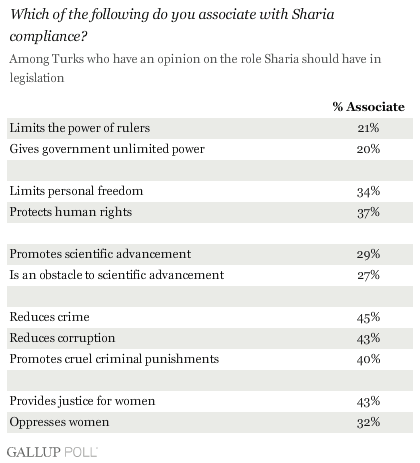WASHINGTON, D.C. -- For many of those watching around the world, Turkey's 2007 elections represented a symbolic referendum on Islam's compatibility with democracy. The country's ruling Justice and Development Party (AKP) resoundingly won with nearly half of the electorate's votes despite protests over its Islamist roots. What's more, the AKP has been widely praised by Western observers for the economic reforms and anti-corruption efforts launched since it first took power in 2002. However, tensions between the AKP and the country's secularists remain, and may surge again with the AKP's announcement Friday that it plans to relax the current ban on wearing Islamic headscarves in universities in its new draft constitution.
Turkey has become an important part of the dialogue about differences between the Muslim world and the West. With strong ties to both, Turkey seems to be making up its own rules. It is pursuing membership in the European Union, but also reaffirming ties with Middle Eastern countries. Its current constitution bans women from wearing headscarves in public buildings and universities, yet the wives of both the president and the prime minister wear the hijab in public. The staunchly secularist military is the institution in which Turks are most likely to express confidence -- but religious organizations are second on that list.
Such seeming contradictions make it difficult to know where the Turkish population stands when it comes to the role of religion in the public sphere. ������ Poll results from earlier this year make one thing clear: Turks' attitudes regarding Sharia (Islamic religious law) are different from those in many other predominantly Muslim countries in the Middle East. When asked in May whether Sharia should be the only source of legislation, a source, but not the only source, or not a source of legislation, 41% chose the latter option; by comparison, in no other predominantly Muslim country in the region was this figure nearly as high. Slightly more than one in four Turks (26%) say Sharia should be one source of legislation, but not the sole source, while just 7% say it should be the only source.

Contrasting Views of Sharia
The survey also presented respondents with a series of questions about the effects of Sharia compliance. Compared with other predominantly Muslim populations, which are typically likely to associate Sharia with a variety of positive effects, the Turkish public is ambivalent.
Opposing viewpoints are seen in a number of important areas. About one in five Turks (21%) who have an opinion on the role Sharia should have in legislation say Sharia limits the power of rulers -- but close to the same percentage (20%) say it gives government unlimited power. Turks are about as likely to say Sharia limits personal freedom (34%) as they are to say it protects human rights (37%). They are also about as likely to say Sharia compliance promotes scientific advancement (29%) as they are to say it is an obstacle to such advancement (27%).
The view promulgated by many Muslims that Sharia provides a hedge against corruption is shared by almost half of Turks -- 45% say Sharia compliance reduces crime and 43% say it reduces corruption. However, almost as many Turks (40%) associate Sharia with the promotion of cruel criminal punishments, a seemingly negative verdict on its use in criminal law.
Finally, there are competing views on a topic of particular concern among Westerners: the status of women under Islamic law. Currently in Turkey, those who view Sharia as female-friendly seem to have the edge; 43% of Turks feel compliance provides justice for women, although about one-third (32%) say it oppresses women.

Bottom Line
The prevalence of conflicting perspectives on Sharia among Turks reveals just how deeply the rift between the country's secularists and Muslim democrats runs. The arguments are not only about the appropriate role of religion in public life, but also perhaps more fundamentally about the perceived advantages and disadvantages Islamic law may represent for future political and economic efforts. The way in which Turks move toward greater consensus on these questions may well have ramifications for similar processes elsewhere in the Muslim world.
Survey Methods
Results are based on face-to-face interviews with 1,001 adults in Turkey, aged 15 and older in May 2007. For results based on the total sample of national adults, one can say with 95% confidence that the maximum margin of sampling error is ±3 percentage points. In addition to sampling error, question wording and practical difficulties in conducting surveys can introduce error or bias into the findings of public opinion polls.
